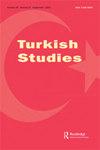对比分析土耳其外交政策的理论方法
IF 1.7
3区 社会学
Q1 AREA STUDIES
引用次数: 3
摘要
本文介绍了一期专门讨论国际关系理论在土耳其外交政策中的应用的特刊。更具体地说,它将结构或新现实主义方法与概念或建构主义方法进行了对比,指出了每种方法的一般优点和缺点,并简要地指出了两者如何适用于TFP。并介绍了特刊的八篇实质性文章。本文章由计算机程序翻译,如有差异,请以英文原文为准。
Contrasting theoretical approaches to Turkish foreign policy
ABSTRACT This article introduces a Special Issue dedicated to applying international relations theories to Turkish foreign policy. More specifically, it contrasts structural or neo-realist approaches with ideational or constructivist ones, suggests general strengths and shortcomings in each, and briefly suggests how both might apply to TFP. It also introduces the eight substantive articles in the Special Issue.
求助全文
通过发布文献求助,成功后即可免费获取论文全文。
去求助
来源期刊

Turkish Studies
AREA STUDIES-
CiteScore
2.80
自引率
7.70%
发文量
44
期刊介绍:
Turkey is a country whose importance is rapidly growing in international affairs. A rapidly developing democratic state with a strong economy, complex society, active party system, and powerful armed forces, Turkey is playing an increasingly critical role in Europe, the Middle East, and the Caucasus. Given Turkey"s significance and the great interest in studying its history, politics, and foreign policy, Turkish Studies presents a forum for scholarly discussion on these topics and more.
 求助内容:
求助内容: 应助结果提醒方式:
应助结果提醒方式:


